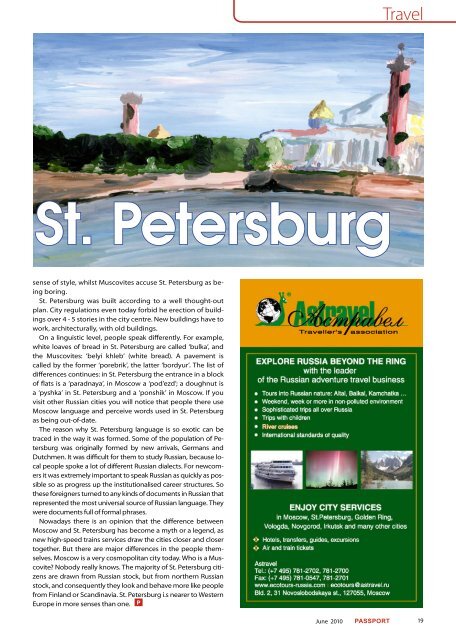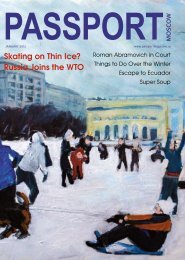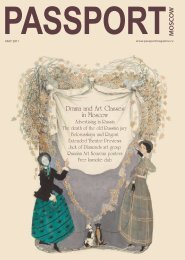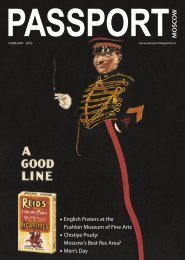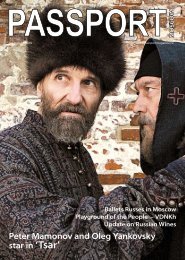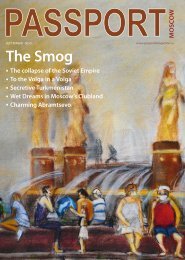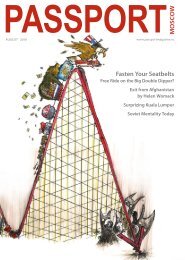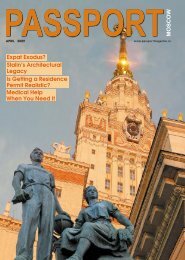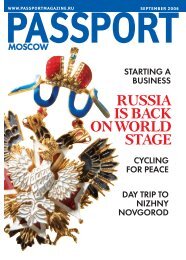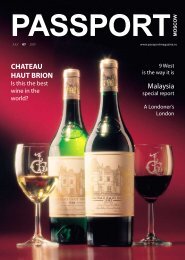M O S C O W Interview with Leonid Shishkin - Passport magazine
M O S C O W Interview with Leonid Shishkin - Passport magazine
M O S C O W Interview with Leonid Shishkin - Passport magazine
You also want an ePaper? Increase the reach of your titles
YUMPU automatically turns print PDFs into web optimized ePapers that Google loves.
St. Petersburg<br />
sense of style, whilst Muscovites accuse St. Petersburg as being<br />
boring.<br />
St. Petersburg was built according to a well thought-out<br />
plan. City regulations even today forbid he erection of buildings<br />
over 4 - 5 stories in the city centre. New buildings have to<br />
work, architecturally, <strong>with</strong> old buildings.<br />
On a linguistic level, people speak differently. For example,<br />
white loaves of bread in St. Petersburg are called ‘bulka’, and<br />
the Muscovites: ‘belyi khleb’ (white bread). A pavement is<br />
called by the former ‘porebrik’, the latter ‘bordyur’. The list of<br />
differences continues: in St. Petersburg the entrance in a block<br />
of flats is a ‘paradnaya’, in Moscow a ‘pod’ezd’; a doughnut is<br />
a ‘pyshka’ in St. Petersburg and a ‘ponshik’ in Moscow. If you<br />
visit other Russian cities you will notice that people there use<br />
Moscow language and perceive words used in St. Petersburg<br />
as being out-of-date.<br />
The reason why St. Petersburg language is so exotic can be<br />
traced in the way it was formed. Some of the population of Petersburg<br />
was originally formed by new arrivals, Germans and<br />
Dutchmen. It was difficult for them to study Russian, because local<br />
people spoke a lot of different Russian dialects. For newcomers<br />
it was extremely important to speak Russian as quickly as possible<br />
so as progress up the institutionalised career structures. So<br />
these foreigners turned to any kinds of documents in Russian that<br />
represented the most universal source of Russian language. They<br />
were documents full of formal phrases.<br />
Nowadays there is an opinion that the difference between<br />
Moscow and St. Petersburg has become a myth or a legend, as<br />
new high-speed trains services draw the cities closer and closer<br />
together. But there are major differences in the people themselves.<br />
Moscow is a very cosmopolitan city today. Who is a Muscovite?<br />
Nobody really knows. The majority of St. Petersburg citizens<br />
are drawn from Russian stock, but from northern Russian<br />
stock, and consequently they look and behave more like people<br />
from Finland or Scandinavia. St. Petersburg i.s nearer to Western<br />
Europe in more senses than one. P<br />
June 2010<br />
Travel<br />
1


